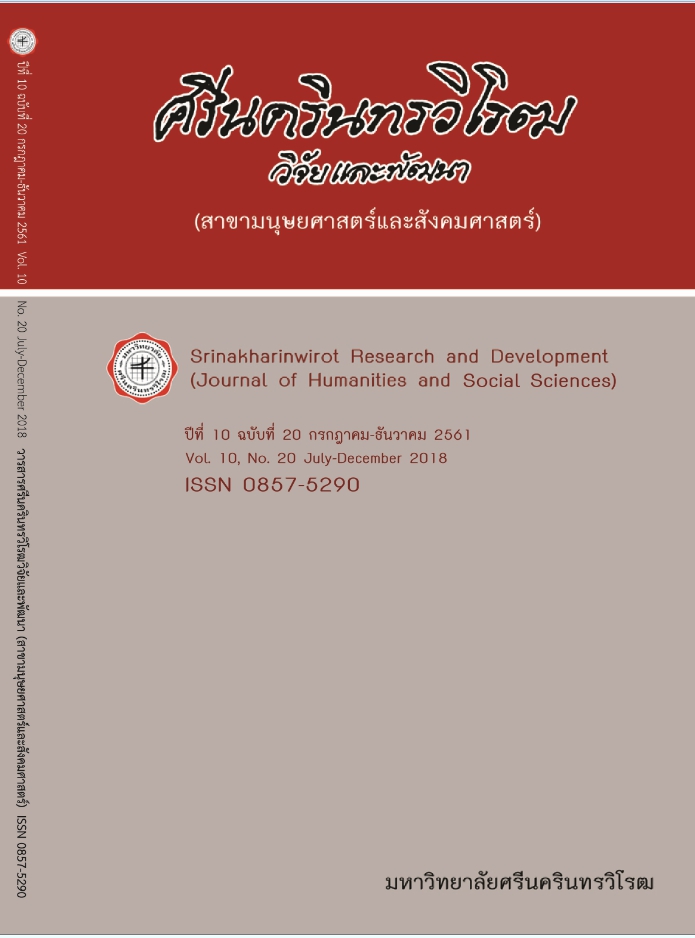ภาษาอังกฤษกับการเติบโตทางเศรษฐกิจ ENGLISH LANGUAGE AND ECONOMIC GROWTH
Keywords:
English, Economic Growth, Panel DataAbstract
This study takes into account the relationship between English proficiency and economic development. Panel Data Models and Seeming Unrelated Regression are employed. The data-base covers the period of 2011 - 2016 with 77 countries. The Barro-type panel growth regression is employed. The empirical results show that English Proficiency has positive effect to economic growth. Therefore, countries with higher levels of English proficiency among the division of its population are likely to grow faster. The results also indicate that higher level of English proficiency is positively related to the level of Human Development Index. Thus, it implies that the levels of English proficiency managed to count as a significant component of human capital development.
Downloads
References
[2] Aghion, P.; & Howitt, P. (1992). A Model of Growth through Creative Destruction. Econometrica. 60(2): 323-351.
[3] Grossmann, G. M.; & Helpman, E. (1991). Innovation and Growth in the Global Economy. Cambridge, MA: MIT Press.
[4] Romer, P. M. (1990). Endogeous Technological Change. Journal of Political Economy. 98(5): S71-S102.
[5] Falvey, R., Foster, N.; & Greenaway, D. (2002). North-South Trade, Knowledge Spillovers and Growth. Journal of Economic Integration. 17(4): 650-670.
[6] Falvey, R., Foster, N.; & Greenaway, D. (2004). Imports, Exports, Knowledge Spillovers and Growth. Economics Letters. 85(2): 209-213.
[7] Pool, J. (1972). National development and language diversity. in Advances in the Sociology of Language, Volume 2: Selected Studies and Applications (Page 213-230). Mouton.
[8] Ufier, A. (2015). The Impact of English Language Skills on National Income: A Cross-National Comparison. from https://www.fdic.gov/bank/analytical/cfr/bios/ufier-english-wp.pdf
[9] Crystal, D. (2003). English as a global language. New York: Cambridge University Press.
[10] Huttner-Koros, A. (2015). The Hidden Bias of Science’s Universal Language. Retrieved November 19, 2017, from https://www.theatlantic.com/science/archive/2015/08/english-universal-language-science-research/400919Journal of Economic Integration. 17(4): 650-670.
[6] Falvey, R., Foster, N.; & Greenaway, D. (2004). Imports, Exports, Knowledge Spillovers and Growth. Economics Letters. 85(2): 209-213.
[7] Pool, J. (1972). National development and language diversity. in Advances in the Sociology of Language, Volume 2: Selected Studies and Applications (Page 213-230). Mouton.
[8] Ufier, A. (2015). The Impact of English Language Skills on National Income: A Cross-National Comparison. from https://www.fdic.gov/bank/analytical/cfr/bios/ufier-english-wp.pdf
[9] Crystal, D. (2003). English as a global language. New York: Cambridge University Press.
[10] Huttner-Koros, A. (2015). The Hidden Bias of Science’s Universal Language. Retrieved November 19,2017, from https://www.theatlantic.com/science/archive/2015/08/english-universal-language-science-research/400919
[11] Grin, F. (2013). Language and development: A general introduction and a few (critical) considerations. Plenary lecture presented at the English Policy Forum. Santiago de Chile: British Council.
[12] Arcand, J.-L.; & Grin, F. (2013). Language in economic development: Is English special and is linguistic fragmentation bad?. in Elizabeth J. Erling, and Philip Seargeant, English and Development: Policy, Pedagogy and Globalization (Page 243-264). Bristol: Multilingual Matters.
[13] Paolo, A. D.; & Tansel, A. (2015). Returns to Foreign Language Skills in a Developing Country: The Case of Turkey. The Journal of Development Studies. 51(4): 407–421.
[14] Azam, M., Chin, A.; & Prakash, N. (2013). The Returns to English-Language Skills in India. Economic Development and Cultural Change. 61(2): 335-367.
[15] Helleseter, M. D. (2013). English Skills and Wages in a Non English Speaking Country: Findings from Online Advertisements in Mexico. Santa Barbara: University of California, Santa Barbara.
[16] Casale, D.; & Posel, D. (2011). English language proficiency and earnings in a developing country: The case of South Africa. The Journal of Socio-Economics. 40: 385–393.
[17] Melitz, J.; & Toubal, F. (2014). Native language, spoken language, translation and trade. Journal of International Economics. 93: 351–363.
[18] Hejazi, W.; & Ma, J. (2011). Gravity, the English language and international business. The Multinational Business Review. 19(2): 152-167.
[19] Lee, C. G. (2012). English Language and Economic Growth: Cross-Country Empirical Evidence. Journal of Economic and Social Studies. 2(1): 5-20.
[20] Barro, R. J. (1997). Determinants of Economic Growth: A Cross Country Empirical Study. Cambridge, MA: MIT Press.
[21] Todaro, M. P.; & Smith, S C. (2015). Economic Development. Harlow: Pearson Education.
[22] Bruthianx, P. (2002). Hold your courses: Language education, language choice and economic development. TESOL quarterly. 275-296.
[23] Zellner, A. (1962). An efficient method of estimating seemingly unrelated regressions and tests for aggregation bias. Journal of the American Statistical Association. 57: 348–368.
[24] Zellner, A. (1963). Estimators for seemingly unrelated regression equations: Some exact finite sample results. Journal of the American Statistical Association. 58: 977–992.
[25] Zellner, A.; & Huang, D. S. (1962). Further properties of efficient estimators for seemingly unrelated regression equations. International Economic Review. 3: 300-313.
[26] Greene, W. H. (2012). Econometric Analysis. 7th ed. Upper Saddle River, NJ: Prentice Hall.
[27] Lee, K. Y. (2011). Hard Truths to Keep Singapore Going. Straits Times Press.
Downloads
Published
How to Cite
Issue
Section
License
Srinakharinwirot Research and Development Journal of Humanities and Social Sciences is licensed Under a Creative Commons Attribution-NonCommercial-NoDerivs 4.0 International (CC-BY-NC-ND 4.0) License, Unless Otherwise Stated. Please Read Journal Policies Page for More Information on Open Access, Copyright and Permissions.



